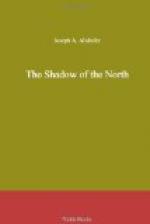“Master Edward Charteris,[A] who is soon to become a member of the Royal Americans,” he said to the others. “He is a native of this town and belongs to one of our best families here. When he does become a Royal American he will probably have the finest uniform in his regiment, because Edward sets the styles in raiment for young men of his age here.”
[Footnote A: The story of Edward Charteris, and his adventures at Ticonderoga and Quebec are told in the author’s novel, “A Soldier of Manhattan.”]
Charteris smiled. It was evident that he and the older man were on the most friendly footing. But he held himself with dignity and had pride, qualities which Robert liked in him. His manner was most excellent too, when Mr. Hardy introduced all of his party in turn, and he readily joined them, speaking of his pleasure in doing so.
“I shall be able to exchange my seat and obtain one with you,” he said. “We shall be early, but I am glad of it. Mr. Hallam and his fine company have been performing in Philadelphia, and as we now welcome them back to New York, nearly all the notable people of our city will be present. Unless Mr. Hardy wishes to do so, it will give me pleasure to point them out to you.”
“No, no!” exclaimed Master Benjamin. “The task is yours, Edward, my lad. You can put more savor and unction into it than I can.”
“Then let it be understood that I’m the guide and expounder,” laughed Charteris.
“He has a great pride in his city, and it won’t suffer from his telling,” said Master Benjamin.
They were now in Nassau Street near the improvised theater, and many other link boys, holding aloft their torches, were preceding their masters and mistresses. Heavy coaches were rolling up, and men and women in gorgeous costumes were emerging from them. The display of wealth was amazing for a town in the New World, but Mr. Hardy and his company quickly went inside and obtained their seats, from which they watched the fashion of New York enter. Charteris knew them all, and to many of them he was related.
The number of De Lanceys was surprising and there was also a profusion of Livingstons, the two families between them seeming to dominate the city, although they lived in bitter rivalry, as Charteris whispered to Robert. There were also Wattses and Morrises and Crugers and Waltons and Van Rensselaers, Van Cortlandts and Kennedys and Barclays and Nicolls and Alexanders, and numerous others that endured for generations in New York. The diverse origin of these names, English, Scotch, Dutch and Huguenot French, showed even at such an early date the cosmopolitan nature of New York that it was destined to maintain.




